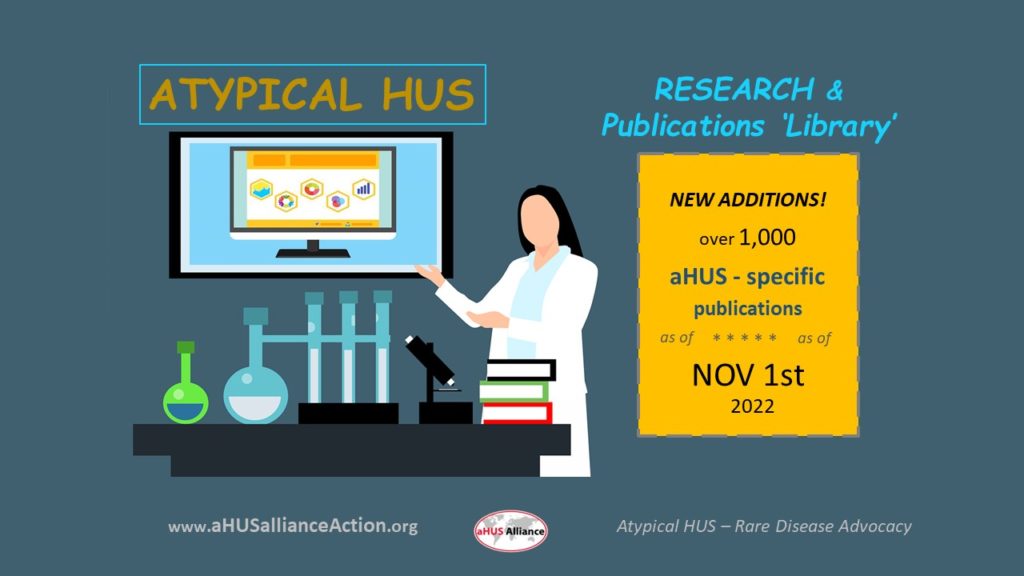
There are important publications about atypical HUS which people might miss given that key search terms may scan but miss the wide variations in the disease’s name and classification. It’s then that it is particularly helpful to have the aHUS global action team direct our spotlight on what’s new for aHUS research. During this year we’ve added dozens of publications to our aHUS Publications & Research page related to atypical HUS diagnosis and treatment, with our latest set of additions posted 1 November 2022.
People who are genetically predisposed to aHUS may experience their first episode of disease early or quite late in life, with potential multi-organ damage from symptoms that can vary greatly in severity and duration. There is still much unknown about how certain circumstances regarding genetics and environmental factors may combine to trigger atypical HUS disease activity, such as: infections (bacterial/viral), pregnancy, certain drugs, organ transplantation, cancer, and inflammation or chronic/autoimmune disease impact. As research progresses, perhaps we’ll also gain more understanding of ‘idiopathic’ cases – people diagnosed with atypical HUS who do not appear to have any underlying cause or genetic factors.
People with atypical hemolytic uremic syndrome are at a distinct disadvantage in trying to find updates on new aHUS knowledge, current research efforts, and drug development. Not only is aHUS rare, but the information stream is fragmented for both patients and for physicians who treat them. In conducting an online search, you’ll find information about atypical HUS tagged with various keywords such as ‘complement’ and ‘thrombotic microangiopathy’. To further complicate matters aHUS studies and publications cut across multiple disciplines, so information may be found within hematology, nephrology, immunology, complementology, or critical care information streams. Add to this the current conversation regarding new classification of the disease itself (our article on the aHUS nomenclature project and potential name change ), and it becomes clearer not only regarding information flow but also what multiple barriers exist for the aHUS studies and clinical trials.
Expanded knowledge about the complement system (part of the body’s immune response) touches upon several key issues related to aHUS, including insights into inflammation, complement activation, and thrombotic microangiopathy (damage from tiny clots in small blood vessels throughout the body). Throughout the year new research has provided a better understanding of COVID-19 issues and care to the general public, but we’ve begun to see a few publications in medical literature where COVID vaccination or infection has triggered aHUS activity. More articles about pregnancy-associated aHUS and discontinuing therapeutic drugs also have been added to our aHUS Publications and research page as well – nearing about 1,000 different publications which are specific to this rare form of thrombotic microangiopathy.
Research articles about atypical HUS are listed within our website on topic-specific lists within our Info Centre, where you can see a list for “New Research” which are then also listed by category. Scroll categories are: New Research, Critical Care, Diagnosis, Treatment, Discontinuing Treatment/Relapse, Thrombotic Microangiopathy (TMA), Extra Renal (Effects on Organs other than Kidneys), Pregnancy, Transplants, Genetics, Complement, Secondary aHUS, Triggers, Research in Specific Nations, Case Studies, Patient Registries: Publications, Drug Discovery/Research, Summary Articles/Literature Reviews, Consensus Documents/Guidelines, and Varied Topics. (Note: All entries from the ‘New Research’ scroll additionally are cross-listed at the start of each specific topic. While this ‘library’ has over 1,000 unique publications, it results in about 1400 dual entries – such as a study that examines mutation impact on disease management, and thus listed on both Genetics and Treatment scrolls.)
.
Questions about the aHUS Research & Publications page, to include suggestions for inclusion of additional aHUS studies and research articles, can be directed to the page curator E: linda@ahusallianceAction.org

